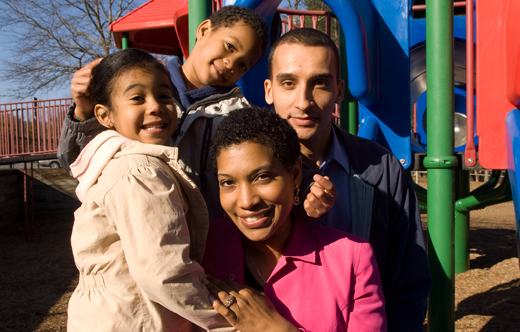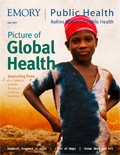Network of strength

Joya Harris pays it forward to help women diagnosed with breast cancer.
By Pam Auchmutey
Joya Harris, 00MPH, never imagined being diagnosed with breast cancer.
She was energetic and enthusiastic, working part-time with youth development and after-school programs in Fayette County and raising two young children. She did all the right things to stay healthy. In November 2007, a month after her annual mammogram screening, she learned that she had stage-III breast cancer.
She continued to do the right things. Before undergoing treatment at Emory University Hospital Midtown, she sought a second opinion at Duke. Her treatment required breast surgery, chemotherapy, radiation therapy, plastic surgery, and a year of HER+ drug therapy. Worse yet, her job provided no health insurance.
|
Focus on cancer |
"It was frightening," recalls Harris, whose cancer is in remission. "I had always been proactive about my health. I paid for my wellness visits out of pocket because my contract work provided no benefits. Then I received my diagnosis and thought, ‘What am I going to do?' "
Because of her background in public health, Harris had access to resources and people from whom to seek advice. She learned about the Women's Health Medicaid Program, a partnership between the Georgia Department of Human Resources and the Georgia Department of Community Health that assists patients who have breast or cervical cancer. Harris qualified for assistance based on her diagnosis and income level. "I'm very grateful. It was a painless process," she says.
Harris knows she was fortunate. "Many women find themselves in a catch-22. They make too much money to qualify for programs that can help and too little to afford health care insurance."
Perfect timing
A college friend who is also a breast cancer survivor offered Harris another piece of advice—call the 24-hour hotline at the Breast Cancer Network of Strength. The Chicago-based nonprofit provides emotional support to women with breast cancer through its Your Shoes 24/7 support center.
Harris thought she didn't need to call anyone. Her mother, children, boyfriend, friends, and colleagues were more than supportive. But when she found herself awake one night, she picked up the phone and talked to a breast cancer survivor on the other end. "Talking with someone who has been where you are is priceless," says Harris.
She also learned that the organization needed an executive director. Her contract in Fayette County had ended. Her previous experience working with the American Red Cross boosted her credentials. Thus Harris achieved two milestones last year. She completed her breast cancer treatment and landed a new job that helps her provide programs and services not only for survivors, but for anyone affected by breast cancer.
Harris was a health policy major in the RSPH, and her coursework taught her how to build partnerships and think strategically. "I learned to fill gaps," she says. "If I can't do it, then who can I partner with who can? Do I need to write a grant? How can I fill a need and provide a sustainable program?"
Her skills now sustain her in a role that requires her to raise funds, develop an affiliate advisory board, provide outreach program training, promote breast cancer awareness among underserved women, partner with health professionals to provide mammograms and clinical breast exams, and assist with logistics for the annual Walk to Empower on Mother's Day and the Ride to Empower in October.
"There's a greater purpose somewhere, and it found me," says Harris. "I'm doing something meaningful for other women with breast cancer."


